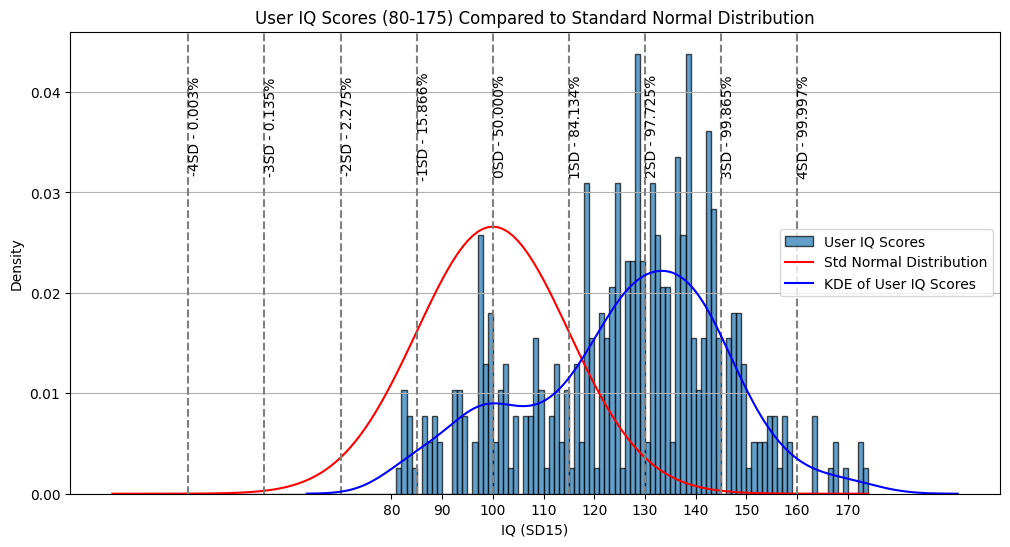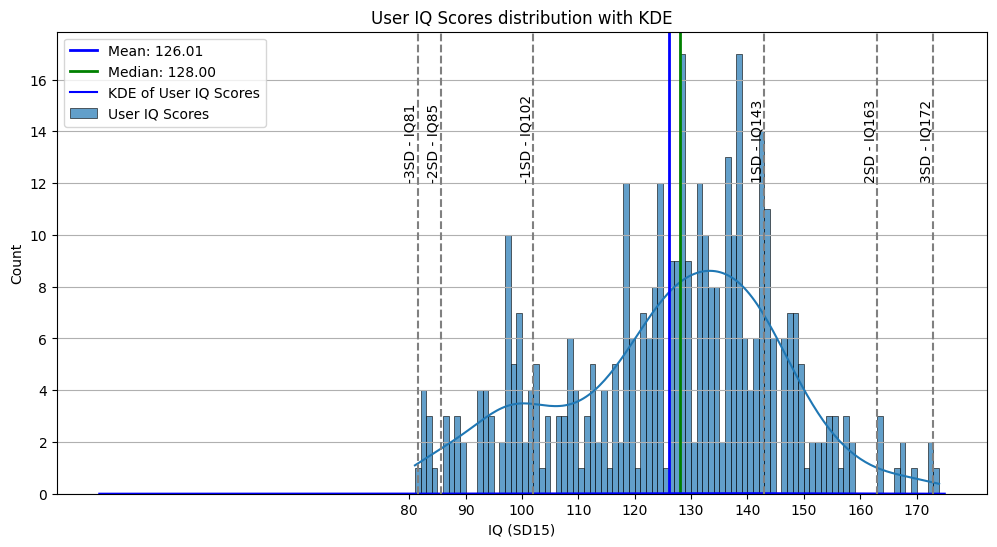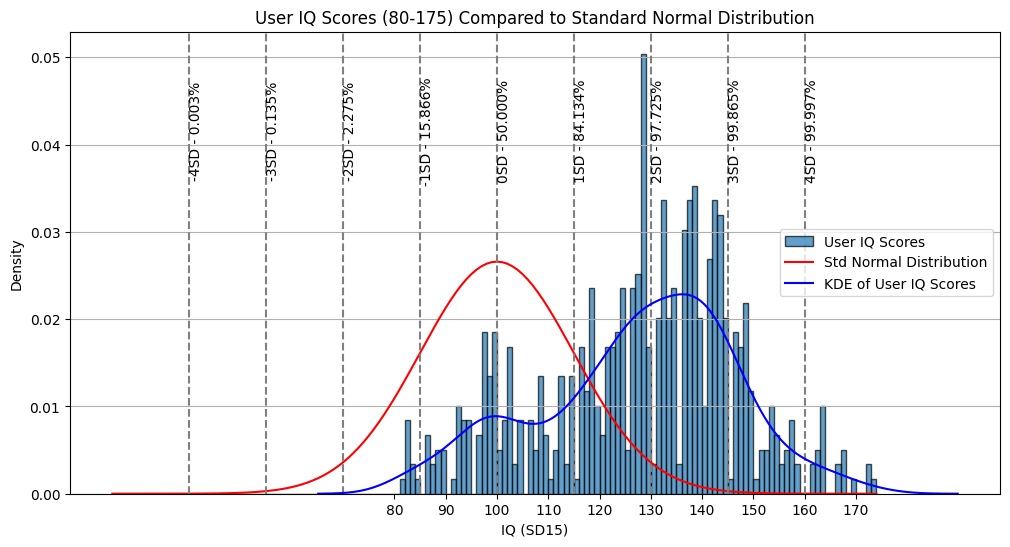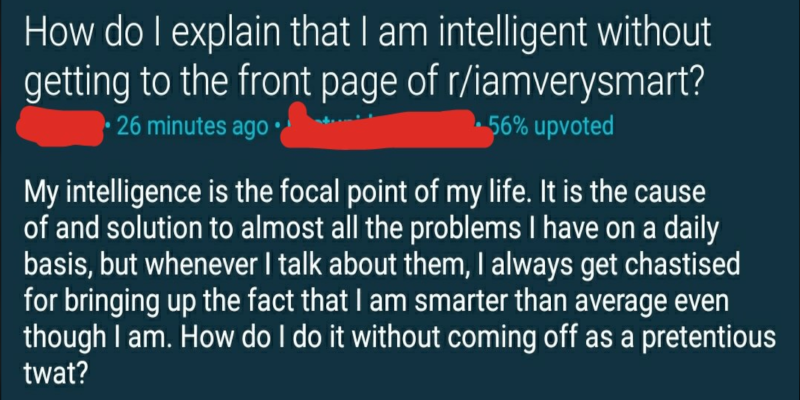Online Everyone is a Genius 🤓
The preparation and analysis methods in this post are rather crude so take everything in here with a grain of salt, this post primarily aims to be entertaining.
Ah, greetings, mere mortals. With my colossal IQ of a staggering 193, I can assure you that this post will be nothing short of incendiary brilliance, though only the most erudite and sophisticated minds will be capable of grasping its true magnificence.
Oh, still lingering, are you? You must be an unparalleled genius yourself, basking in the glow of our shared intellectual superiority. So let’s dive in…
The answer to the post in the banner: You don’t. And don’t talk about your IQ. An IQ score is not an accomplishment. If you are smart, you probably have some cool projects, accomplishments or other products of your capabilities, show those. If you don’t, sure, go on and talk about your estimated intellectual potential in form of an IQ score in some test.
I am not here to discuss the validity of IQ. It is one of the best researched and most reliable metrics of psychology. Although one has to keep in mind, psychometrics is in general a field prone to biases and imprecise measure. Because IQ correlates strongly with some cognitive capabilities, it is used to approximate intelligence. However intelligence is far too complex, multi-faceted and individual to even compare among humans in general form, instead IQ tests usually focus on predictors (e.g. pattern-matching, language, math and processing speed) of the so called g factor, representing general intelligence.
Instead of rambling about its validity I want to focus more about the biases and misrepresentations of IQ scores online. Over the decades, the world and jobs became more and more complex. With that, intelligence is assumed by many to be an important resource for success in work and life. Therefor an incentive emerges for people to conflate high IQ scores with their self-worth, success in work and sometimes even take it as an accomplishment itself.
As people boast about their money, buying overpriced luxurious brands, without much practical value, to show off success, people online also boast about IQ scores and more. So out of curiosity, I analyzed the claimed IQ scores of many Reddit users in various subreddits and compared its distribution to the standard distribution the IQ is normalized by.
Some outcomes were ridiculous…
r/wallstreetbets vs r/cognitiveTesting
I also thought about running an analysis about the wins and losses posted on finance subreddits like r/wallstreetbets. Discovering and analyzing their bias would have been interesting too. But as I am lazy and resource limited, I did not want to extract the losses and wins of images in posts. It would have been quite a workload. Also we do not have a clear baseline to compare the results to, as we have for IQ scores.
Sometimes when scrolling through social-media, especially in discussions, people mention their IQ to support their position or randomly boast about it, mentioning off-the-chart scores. So I dug deeper into it, and there is a subreddit concerned with exposing these people called r/iamverysmart which is quite funny. On the other side, there are serious subreddits like r/cognitiveTesting discussing IQ Tests, scores and sometimes posting puzzles. Apart from some fun puzzles and fancy tests, this subreddit is quite repetitive with people discussing their IQ scores in different tests, asking about estimations of IQ or differences in people in specific IQ ranges.
When scrolling through r/cognitiveTesting I discovered many, sometimes crazily unrealistic scores, which brought me to this post, discovering the underlying distribution and potential liars.
The basics: IQ and the Normal Distribution
This part gives a short simplified overview to understand how IQ tests are made.
IQ tests emerged from the initial idea to distinguish between different learning needs in children with learning difficulties. Over the years, the psychometrics became quite advanced, with IQ testing being steadily researched, advanced and validated.
The today’s IQ tests, aiming to measure intelligence, are still object of heated discourse (e.g. racial/cultural bias, discrimination…). However, overall, they proved to be a good predictor of intellectual capability, job success and more, all suspected to correlate with intelligence. In theory, the IQ should hint to a psychometric concept, called the g factor, being general intelligence. To measure general intelligence, a set of questions from a variety of categories (e.g. patterns, verbal, math, memory, spacial) are tested on a large group of people representing an (hopefully not too biased) sample of overall society.
Questions which predict the score in a specific area the best, are then extracted and put in the final IQ test. To ensure that what is measured correlates with the g factor, the results are compared with established measures of intelligence and activities that are believed to require general cognitive ability. But in practice, they generally aim to align the IQs of the new test, with the IQ in other tests which were considered valid and highly g-loaded (measuring general intelligence well).
To produce a final IQ score, we let a large test group representing an age group in society, answer the questions, calculate how well they did relatively to the rest (calculate percentiles) and produce IQ scores from the percentiles by calculating how many standard deviations, the percentile was away from the mean. Usually one standard deviation equals 15 points (SD15) and from now on we assume this SD if not further specified. So someone who is 2 SD over the mean (100), has an IQ of 130 (≈ 98 percentile).
Extracting the claimed IQ scores
Using PRAW, a Reddit API Wrapper for Python, I extracted all posts and related comments, including relevant metadata, from subreddits I found, where I expected people to mention their IQ scores the most. It included r/Gifted, r/cognitiveTesting, r/iqtest and an ironic one: r/iamverysmart.
I analyzed them in separation, as well as in aggregation. I did an Exploratory Data Analysis (EDA) on the raw data to ensure its correctness and to find out coarse patterns, such as the length distribution of comments, the most common post tags (also known as post flairs), the user flairs, most frequent commenters and more. I did not find any unusual patterns yet. In the following analysis, I will focus specifically on r/cognitiveTesting as it had by far the highest density of IQ mentions in the data. Reddit’s API limits scraping heavily, so I was only able to scrape the data of the last 3 months posted in this subreddit.
For more significant results and other potential analysis, I installed some cronjobs (scripts running periodically) to regularly gather the newest data of many subreddits, from now on.
After the EDA, I extracted the mentioned IQ scores through multiple steps:
- Use a RegEx pattern to detect IQ like numbers in post and comment texts.
- Search for keywords around matched score to determine its relevance (e.g. “IQ”, “score”, “WAIS”, “AGCT” etc.)
- Remove open ended mentions such as “132+ iq”
- Filter for user-tied IQs by searching for indicative keywords like “I” or “my” in previous words. (Simple, but worked quite well)
- Normalize the score to SD15 if another SD scale was mentioned.
- Remove scores divisible by 5 (why? see next chapter)
- Group mentioned scores per user, remove strong outliers with z-scores and take the mean of the rest, to obtain the final IQ of a user.
Despite these crude and rather unscientific methods, this approach left us with suprisingly good results. Of course there is some noise in this data, but when checking it manually there were astonishingly few. The risk of taking ironic mentions into account and some other small inprecisions exists, but overall considering the simplicity and efficiency of this approach, it proves to be quite effective without much noise destroying the distribution.
The Results
The following will present the results of the short analysis, I will leave some room for interpretation and sprinkle in some of my own, I must admit, handwavy arguments.
Ignore the dips for scores divisible by 5, they are an artifact of our methods: As most of them were used for discussing approximates and boundaries, I ignored them in the calculation of the user scores. This entails, that we will be blind to potential biases in reported scores divisible by 5, but otherwise does not change the general shapes of the distributions.
r/cognitiveTesting
This subreddit had by far the most IQ mentions, although it is rather small with 30k members. As the Reddit API is highly limited, I only attained a sample size of n=388 individual users mentioning their IQ in the last 3 months. Although not strongly significant they exposed some interesting tendencies…
 Normal distribution of IQ in red, claimed IQ distribution of r/cognitiveTesting users in blue.
Normal distribution of IQ in red, claimed IQ distribution of r/cognitiveTesting users in blue.
We observe a bimodal distribution, the first hill poorly approximating the real distribution, and the second hill, showing a dominating right-shifted normal distribution. Notice that the percentile can be extracted as the area under the normal distribution to the left side, from a given x-value (IQ). As we can see IQs 3 SDs over the mean (145+) are quite unusual but not totally unrealistic, as many IQ tests scale to 145 (1 in 741) or even 160 (1 in 31,560), which is already super rare and not reliably measurable.
However, when examining the distribution of scores on these subreddits, we notice quite a few unusually high scores that seem suspicious and unrealistic. It seems unlikely that these purported geniuses would spend their time discussing their scores online instead of utilizing their alleged intellectual abilities.
Apart from this absurd distribution, which suggests misrepresentation due to its improbability, we also observe funny-smelling trends in the scores. These trends are also present in other serious subreddits, such as r/Gifted.
In r/cognitiveTesting, IQ scores of exactly 128 and 138 are mentioned most frequently by a clear margin. Similarly, in r/Gifted, there is a noticeable spike at 128, likely related to people wondering if they are gifted despite being just below the threshold.
This pattern seems sus. Perhaps these scores are psychologically favored when people fabricate IQ scores. This is just a hypothesis based on the observation that people are generally poor at simulating random choices. For example, when asked to choose a random number between 1 and 100, people are most likely to choose numbers like 73 or 37 or other “prime-esque” numbers.
 IQ distribution of r/cognitiveTesting with its own standard deviation based on the estimated distribution. Mean and median marked in blue (the left vertical line) and green (the right vertical line).
IQ distribution of r/cognitiveTesting with its own standard deviation based on the estimated distribution. Mean and median marked in blue (the left vertical line) and green (the right vertical line).
Given this distribution, the improbability of this occuring when testing is striking, even with a really high selection bias. Based on the r/cognitiveTesting IQ distribution, a 163+ IQ (1 in 74,883) is as rare in the subreddit as a 130+ IQ (1 in 44) in the general society. Hmm, sure…
r/Gifted
The r/Gifted subreddit is a community for everything related to intellectual Giftedness, which is generally considered for IQ scores 2 SD above the mean, which corresponds to an IQ of 130+. In this sub, they discuss everything related to Giftedness, focusing less on IQ scores, but mostly on social issues, opinions and tips.
Therefor I only got a small sample of n=159 users, which led to a similar distribution as in r/cognitiveTesting except with less outliers to the extremes and an increased mean (132) and median (134), which sounds plausible.
General IQ Claims of Reddit Users
I excluded r/iamverysmart, as most of those scores where ironically mentioned there, and I want to focus more on the people mentioning them seriously. But for those who wonder, r/iamverysmart as expected had the highest mean with 138 and hilariously high outliers.
By incorporating all IQ score mentions of the remaining subreddits and graphing the distribution, a similar but slightly smoother distribution is produced. Bare in mind, that the samples n=595 where dominated by r/cognitiveTesting users.
 Distribution of claimed IQ scores on Reddit (mean: 127, median: 129)
Distribution of claimed IQ scores on Reddit (mean: 127, median: 129)
How r/cognitiveTesting reacted
Yes, I actually posted these stats to their subreddit. I refrained from posting my interpretation of the results, to observe the base reaction of its members. Basically, their reactions were one of those types:
- Memeing: Making fun of the subreddit (rare) and its users
- Sceptical: Most people are lying about their score / How did you ensure x in your statistics?
- Defensive: The results seem plausible given the high selection bias
- Memeable: “Hey nice statistics. You know I have an IQ of 168” *continues in detail, mentions family member’s IQ and history…* (Yes, this type occured more than once)
Final words
In this post we discovered that Reddit, specifically some subreddits are frequented by many unmatched geniuses. Just to cite one of the users with 14 upvotes: “It’s almost startling how few leaps forward in the understanding of any area of learning have occurred within this subreddit, given that many of the smartest people alive frequent it.”.
Sure, online, everyone is a genius… They may not display it in their actions, but at least they have their IQ and many communities to share and discuss their score with, cause that’s what geniuses apparently do, right? But let’s be real, most people in the high ranges seem to either lie about their score or use scores from unscientific sources, unstandardized and inflated in nature.
Either way, it is apparent many humans fail to understand the underlying statistics. There are still reports of people with SD15 scores over 160, just not measurable in any well-standardized manner. There are people like Chris Langan, stating 210 IQs without standard deviations, which is hilarious, as its rarity is magnitudes over the world’s population for SD15.
To be fair, those subreddits might not be as douchy as it seems in this post. While focusing on a specific section of r/cognitiveTesting for this post, I stumbled upon a few interesting discussions and some fun puzzles while rabbit-holing into their sub.
I hope you had some fun reading through this and thinking about the found statistics. IQ may be helpful for specific psychological assessments, for getting some rough overview over ones cognitive capabilities, but otherwise can be quite well ignored in life. If you still like to do one, I had fun with some cool puzzles on Brght IQ, the largest actively standardized online test.
Instead of an estimated range, you can also get your “precise” score for free when using my link. But warning, I will receive your score over this link, so feel free to use pseudonyms and a throw-away mail, such as Temp Mail to stay anonymous. I don’t know how accurate it will be as it is no clinical test, still, puzzles are moderately fun.
As always feel free to request the data and access to its GitHub via mail or else.
Thanks for reading! :)
